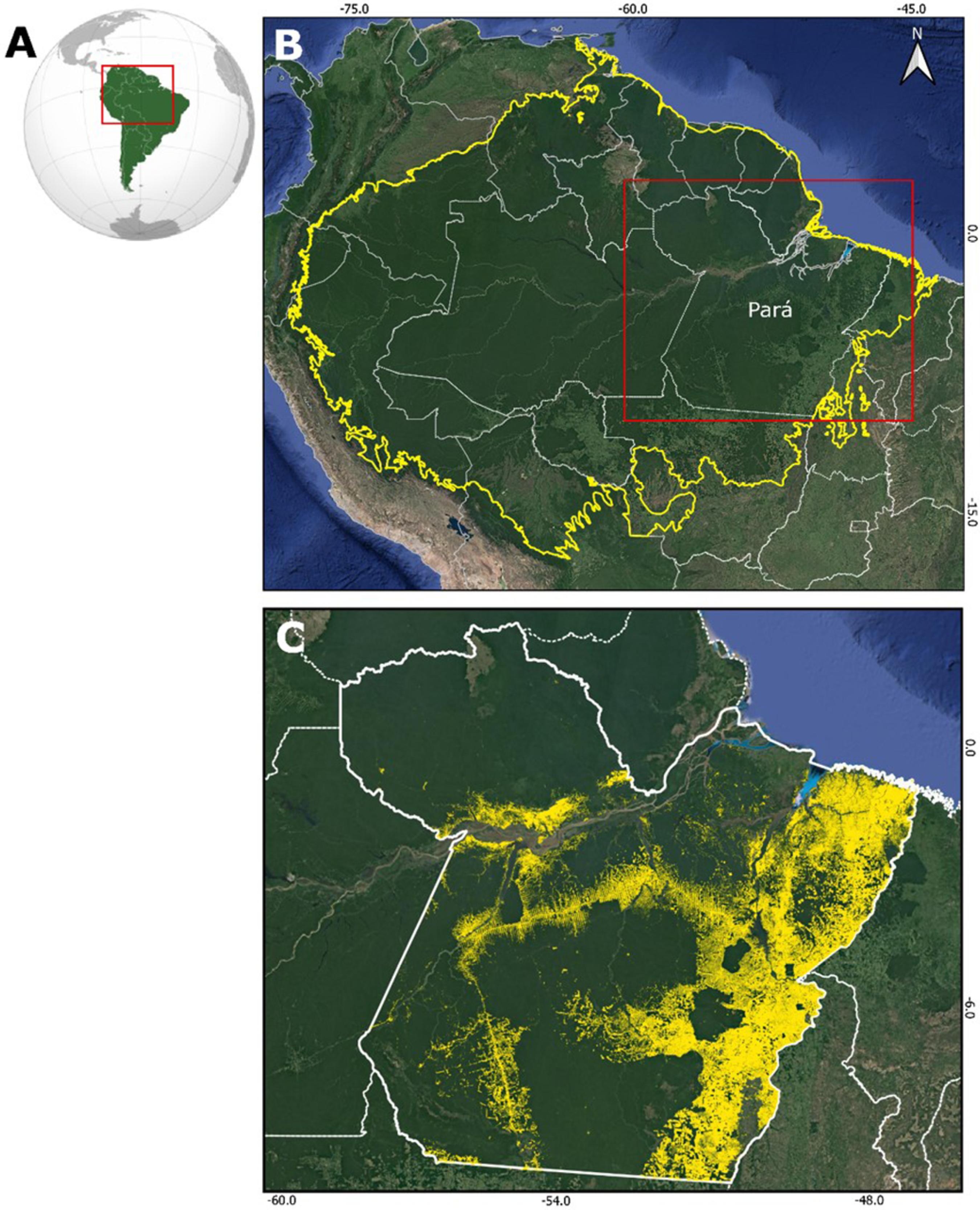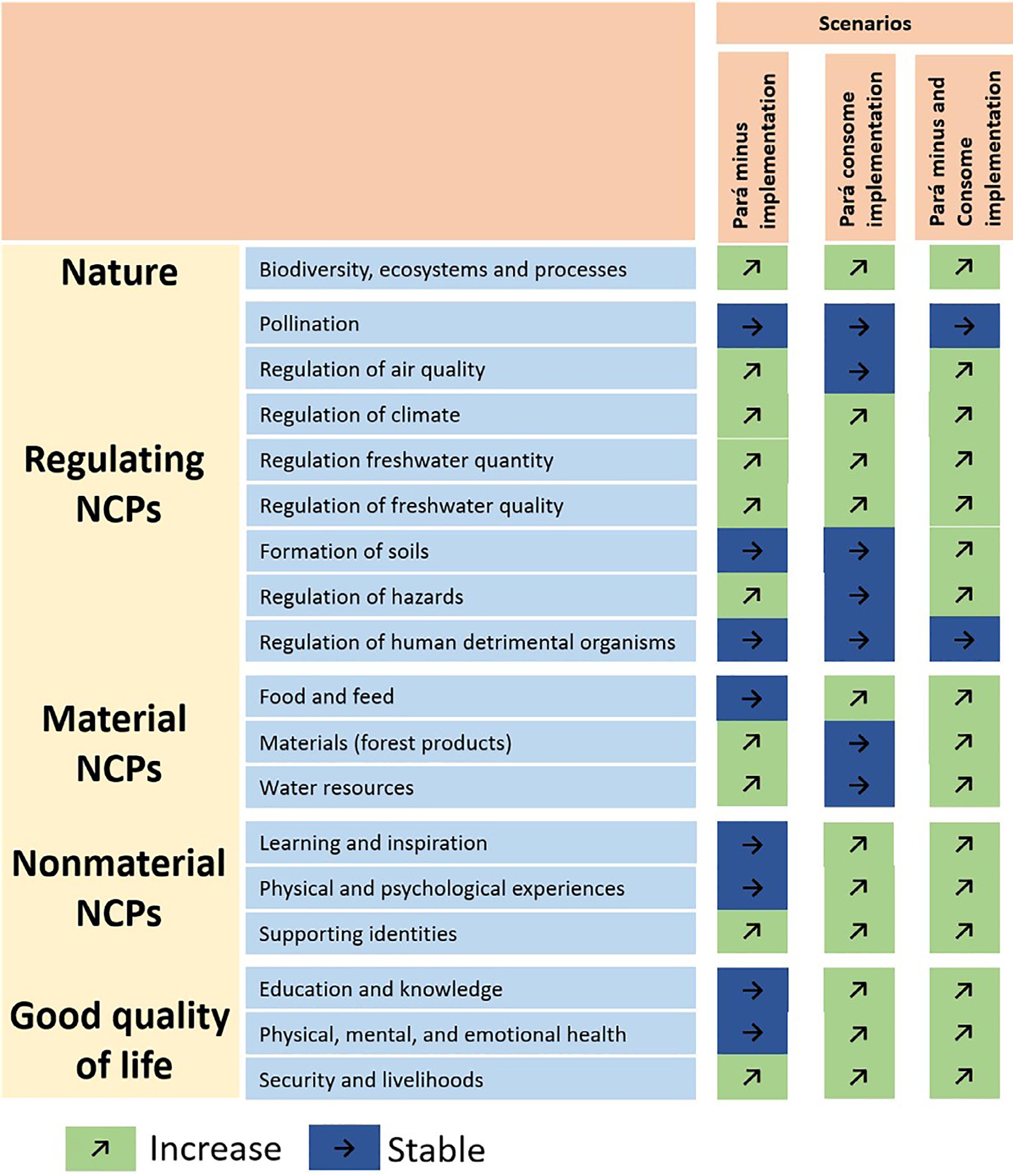| Roads |
Soares-Filho et al. (2006)SOARES-FILHO, B.S., NEPSTAD, D.C., CURRAN, L.M., CERQUEIRA, G.C., GARCIA, R.A., RAMOS, C.A., VOLL, E., MCDONALD, A., LEFEBVRE, P. & SCHLESINGER, P. 2006. Modelling conservation in the Amazon basin. Nature 440(7083):520-523.; Barber et al. (2014)BARBER, C.P., COCHRANE, M.A., SOUZA, C.M. & LAURANCE, W.F. 2014. Roads, deforestation, and the mitigating effect of protected areas in the Amazon. Biol. Conserv. 177(2014):203-209.
|
| Degradation by fire and logging |
Barlow et al. (2012)BARLOW, J. et al. 2012. Quantifying the biodiversity value of tropical primary, secondary, and plantation forests. PNAS 104(47):1-256.; Anderson et al. (2015)ANDERSON, L.O., ARAGÃO, L.E.O.C., GLOOR, M., ARAI, E., ADAMI, M., SAATCHI, S., MALHI, Y., SHIMABUKURO, Y.E., BARLOW, J., BERENGUER, E. & DUARTE, V. 2015. Disentangling the contribution of multiple land covers to fire-mediated carbon emissions in Amazonia during the 2010 drought. Global Biogeochem. Cycles 29:1739-1753.; Pinheiro et al. (2016)PINHEIRO, T.F., ESCADA, M.I.S., VALERIANO, D.M., HOSTERT, P., GOLLNOW, F. & MÜLLER, H. 2016. Forest degradation associated with logging frontier expansion in the Amazon: The BR-163 region in southwestern pará, Brazil. Earth Interact. 20(17):1-26.
|
| Hydropower projects |
Athayde et al. (2019)ATHAYDE, S., DUARTE, C.G., GALLARDO, A.L.C.F., MORETTO, E.M., SANGOI, L., DIBO, A.P.A., SIQUEIRA-GAY, J. & SANCHEZ, L.E. 2019. Improving policies and instruments to address cumulative impacts of small hydropower in the Amazon. Energy Policy In Press(May):265-271.; Chen et al. (2015)CHEN, L., YANG, X., CHEN, L. & LI, L. 2015. Impact assessment of land use planning driving forces on environment. Environ. Impact Assess. Rev. 55:126-135.; Fearnside (2006FEARNSIDE, P.M. 2006. Dams in the Amazon: Belo Monte and Brazil’s hydroelectric development of the Xingu River Basin. Environ. Manage. 38(1):16-27., 2015)FEARNSIDE, P.M. 2015. Amazon dams and waterways: Brazil’s Tapajós Basin plans. Ambio 44(5):426-439.
|
| Urban expansion |
Tritsch & Le Tourneau (2016)TRITSCH, I. & LE TOURNEAU, F.M. 2016. Population densities and deforestation in the Brazilian Amazon: New insights on the current human settlement patterns. Appl. Geogr. 76163-172.
|
| Agriculture and pasture expansion |
Cabral et al. (2018)CABRAL, A.I.R., SAITO, C., PEREIRA, H. & LAQUES, A.E. 2018. Deforestation pattern dynamics in protected areas of the Brazilian Legal Amazon using remote sensing data. Appl. Geogr. 100(October):101-115.; Simon & Garagorry (2005)SIMON, M.F. & GARAGORRY, F.L. 2005. The expansion of agriculture in the Brazilian Amazon. Environ. Conserv. 32(3):203-212.
|
| Land occupation |
Brown et al. (2016)BROWN, D.S., BROWN, J.C. & BROWN, C. 2016. Land occupations and deforestation in the Brazilian Amazon. Land use policy 54:331-338.; Fearsnide (2008)FEARSNIDE, P.M. 2008. The roles and movements of actors in the deforestation of Brazilian Amazonia. Ecol. Soc. 13(1):23.
|
| Climate change |
Anderson et al. (2015)ANDERSON, L.O., ARAGÃO, L.E.O.C., GLOOR, M., ARAI, E., ADAMI, M., SAATCHI, S., MALHI, Y., SHIMABUKURO, Y.E., BARLOW, J., BERENGUER, E. & DUARTE, V. 2015. Disentangling the contribution of multiple land covers to fire-mediated carbon emissions in Amazonia during the 2010 drought. Global Biogeochem. Cycles 29:1739-1753.; Aragão et al. (2018)ARAGÃO, L.E.O.C. et al. 2018. 21st Century drought-related fires counteract the decline of Amazon deforestation carbon emissions. Nat. Commun. 9(1):1-12.
|
| Mining |
Sonter et al. (2017)SONTER, L.J., HERRERA, D., BARRETT, D.J., GALFORD, G.L., MORAN, C.J. & SOARES-FILHO, B.S. 2017. Mining drives extensive deforestation in the Brazilian Amazon. Nat. Commun. 8(1):1013.; Souza-Filho et al. (2016)SOUZA-FILHO, P.W.M., DE SOUZA, E.B., SILVA JÚNIOR, R.O., NASCIMENTO, W.R., VERSIANI DE MENDONÇA, B.R., GUIMARÃES, J.T.F., DALL’AGNOL, R. & SIQUEIRA, J.O. 2016. Four decades of land-cover, land-use and hydroclimatology changes in the Itacaiúnas River watershed, southeastern Amazon. J. Environ. Manage. 167175-184.
|
|
Indirect drivers of deforestation:
|
References
|
| Energy demand |
Fearnside (2006)FEARNSIDE, P.M. 2006. Dams in the Amazon: Belo Monte and Brazil’s hydroelectric development of the Xingu River Basin. Environ. Manage. 38(1):16-27.; Latrubesse et al. (2017)LATRUBESSE, E.M., ARIMA, E.Y., DUNNE, T., PARK, E., BAKER, V.R., HORTA, F.M., WIGHT, C., WITTMANN, F., ZUANON, J., BAKER, P.A., RIBAS, C.C., NORGAARD, R.B. & FILIZOLA, N. 2017. Damming the rivers of the Amazon basin. Nat. Publ. Gr. 546(7658):363-369.
|
| Population growth |
Perz (2002)PERZ, S.G. 2002. Deforestation and land use in the Amazon. Univeristy Press of Florida, Gainesville.
|
| Land price |
Mahar (1989)MAHAR, D.J. 1989. Government Policies and Deforestation in Brazil’s Amazon Region. The International Bank for Reconstruction and Development, World Bank.
|
| Commodity demand |
Gibbs et al. (2015)GIBBS, H.K., RAUSCH, L., MUNGER, J., SCHELLY, I., MORTON, D.C., NOOJIPADY, P., SOARES-FILHO, B., BARRETO, P., MICOL, L. & WALKER, N.F. 2015. Brazil’s Soy Moratorium. Science (80-. ). 347(6220):377-378.; Soterroni et al. (2019)SOTERRONI, A.C., RAMOS, F.M., MOSNIER, A., FARGIONE, J., ANDRADE, P.R., BAUMGARTEN, L., PIRKER, J., OBERSTEINER, M., KRAXNER, F., CÂMARA, G., CARVALHO, A.X.Y. & POLASKY, S. 2019. Expanding the Soy Moratorium to Brazil’s Cerrado. Sci. Adv. 5(7):eaav7336.
|








